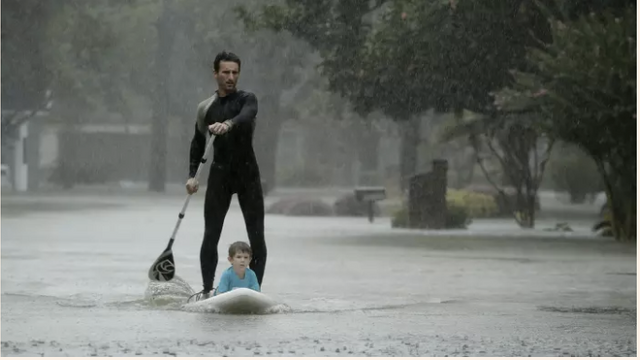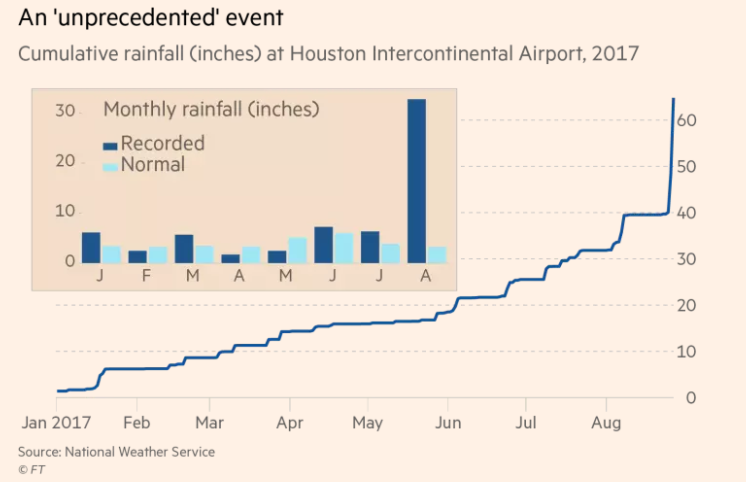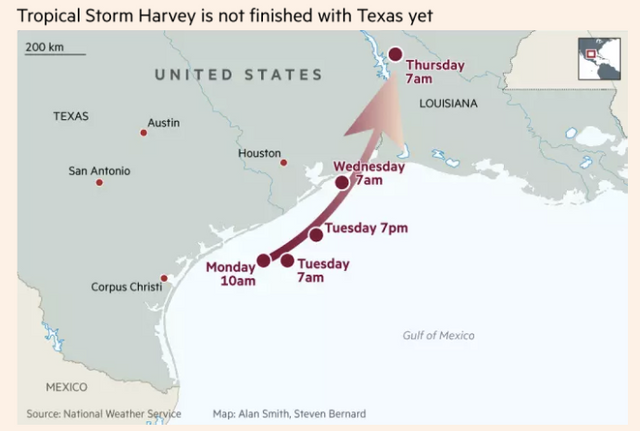Insurers and energy companies count the cost of Harvey by the Financial Times

Thousands of flood victims could lack adequate insurance.
The insurance and energy industries are struggling to assess the damage from what analysts said could be one of the 10 costliest storms in US history as tropical storm Harvey carved a slow, destructive path across the Texas coastline.
The bill for insurers was expected to come to between $10bn and $20bn, according to a “best guess” estimate from JPMorgan Chase — but insurance companies are expected to cover an unusually small portion of the economic losses.
Thousands of victims whose homes were damaged or destroyed could lack adequate cover. Analysts expect flooding, which is typically excluded from residential policies, to cause more damage than winds.
Harvey, which made landfall at the weekend as a dangerous category 4 hurricane, has already dumped more than two feet of water on the Gulf of Mexico coast, flooding roads, closing ports and shutting oil refineries that are critical fuel suppliers to the US and other countries.
Even after weakening into a tropical storm it unleashed flash floods along southern Texas and into Louisiana and threatens a “historic” 50 inches of rain in locations including Houston, the National Weather Service said on Monday. By Monday morning some communities close to Houston has already seen almost 40 inches of rain.
The storm will be the first test of President Donald Trump’s response to a major natural catastrophe. The White House declared an emergency in Louisiana on Monday, following an earlier disaster determination for Texas.
Mr Trump said the storm was a “terrible tragedy” and that it would be a long road for Texas, in a joint press conference with Finland’s president Sauli Niinisto on Monday.

Asked if his recent threat to potentially shut down the government over the dispute over border wall funding would hurt the situation in Texas, Mr Trump insisted the two matters were separate and predicted that “many billions” of dollars of funding for Texas would be authorized by Congress. He added: “We think you are going to have what you need and it is going to go fast.”
The president denied that the relief effort would be impacted by proposed cuts to the Federal Emergency Management Agency, under which funding for cities and states to prepare for natural disasters would be reduced. Mr Trump said the agency had the money needed for Texas, and for Louisiana if required.
Brock Long, the agency’s administrator, said he expected more than 450,000 people would seek disaster assistance and more than 30,000 people would need to be placed in temporary shelters because of flooding.
The disaster has again highlighted the shortcomings of flood insurance provision.
Private sector insurers exclude flood damage from residential policies. Bills for flooding are covered by the taxpayer-backed National Flood Insurance Program, which needs to be reauthorised by Congress by the end of next month or it will expire.
Only about 269,000 properties in the Houston area are in officially designated flood zones, which require them to have flood cover if the property has a federally insured mortgage, according to the data provider CoreLogic.
More than four times as many residential properties in the area — about 1.2m — do not lie in the official zone but are still considered by CoreLogic to be at either “moderate” or “high” risk of flooding.
While losses for insurers should be manageable for the well-capitalised industry, about $12bn was nevertheless knocked off the value of 24 of the sector’s biggest companies on Monday.
The KBW Insurance Index fell 2.3 per cent, as it became clear that the damage was worse than initially expected.
Companies that have sold commercial insurance policies are expected to be worst hit.
The storm also roiled energy markets. US gasoline futures jumped 3.5 per cent higher to $1.7251 per gallon on Monday, paring some gains after surging as much as 6.8 per cent in an overnight session. US crude oil futures sank by 3.4 per cent to $46.25 as the storm shut down oil refineries, the main consumers of crude.
Traders said prices could gyrate further as the extent of destruction became clearer.
“There’s just a lot of uncertainty at this point,” said Mark Anderle, director of supply and trading at TAC Energy, a Dallas-based fuels wholesaler. “Until the storm passes, until they’re able to go in and assess potential damage to refineries, pipelines, et cetera, it’s just hard to say.”

The US Gulf coast is home to more than 45 per cent of US oil refining capacity, according to the Energy Information Administration. Refineries owned by companies including ExxonMobil, Koch Industries and Royal Dutch Shell had shut or were in the process of shutting down, removing 2.2m barrels per day of capacity, S&P Global Platts said.
The storm also prompted oil producers to suspend production at both offshore platforms and wells in the Eagle Ford shale, which stretches inland from Corpus Christi. Ryan Sitton, a commissioner at the Texas Railroad Commission, an oil and gas regulator, estimated billions of dollars of impact on oil and natural gas production and refining, just in the short term.
“There’s no question that this storm’s impact on the oil and gas industry will be felt across Texas, the nation, and the global energy market,” Mr Sitton said.
Mark Vonderheide, managing partner at GEM, a New York-based energy trading company, said futures volumes were low on Monday as traders assessed the destruction and some in Houston could not come to work.
“The sense is that we’re just a third into this, and people just don’t really know” the impact, he said.
A veteran oil trader, Mr Vonderheide recalled how energy markets behaved when a past hurricane rolled through the Gulf coast, causing refineries to close. He and his colleagues held back until they heard a report of alligators swimming in the control room of a major refinery.
“We haven’t heard reports of any alligators in a refinery’s control room yet,” he said.
Follow @jessethan for more articles like this!

Copying/Pasting full texts is frowned upon by the community.
Some tips to share content and add value:
Repeated copy/paste posts could be considered spam. Spam is discouraged by the community, and may result in action from the cheetah bot.
Creative Commons: If you are posting content under a Creative Commons license, please attribute and link according to the specific license. If you are posting content under CC0 or Public Domain please consider noting that at the end of your post.
If you are actually the original author, please do reply to let us know!
Thank You!